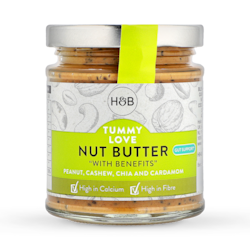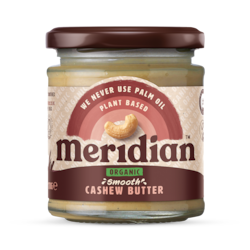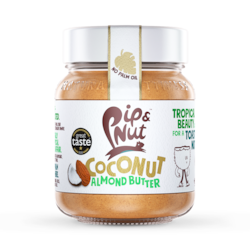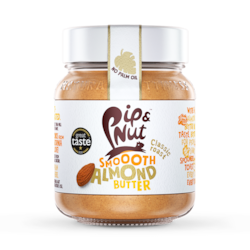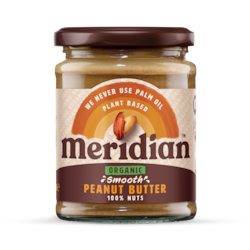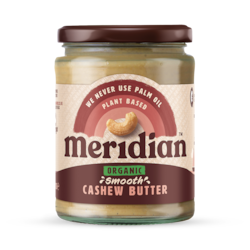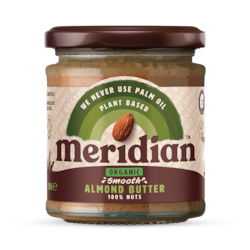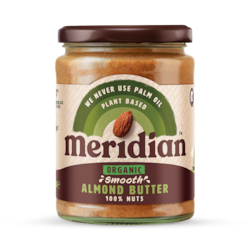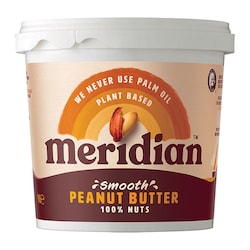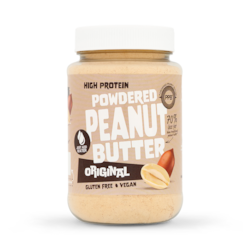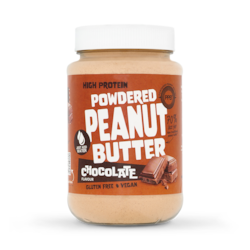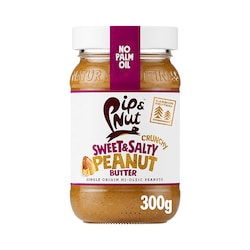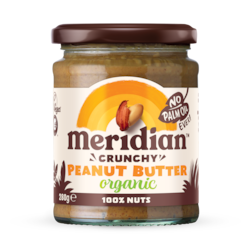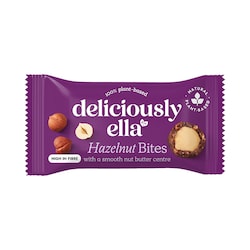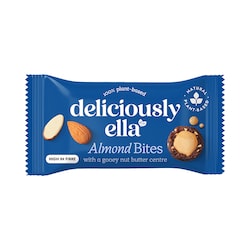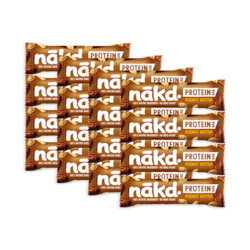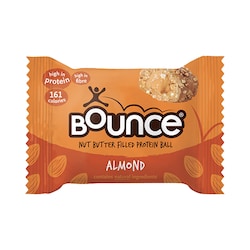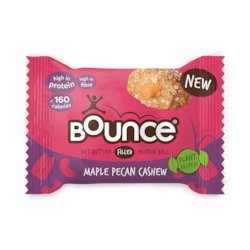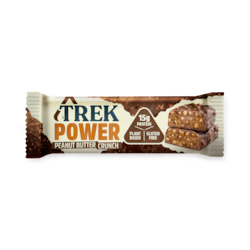20% off £35
Code:OFFER
Is cashew nut butter good for you?

Move over peanut butter – cashew is the hot new nut butter on the block…
Summary
1What is cashew butter?
Cashew butter is a spread made from roasted or baked cashew nuts…
2Is cashew butter good for you?
Cashew butter is packed with nutrients, like protein, healthy fats and fibre that can all benefit your body in different ways…
3What makes cashew butter unhealthy?
Cashew butter can have a high fat content and contain added sugars, oils and salt…
Cashew butter is now a much-loved food cupboard staple renowned for its rich, sweet flavour, and you’ll likely spot it on the shelves amongst other nut butters like almond or peanut. But is this indulgent spread actually good for you or is it just a tasty treat?
What is cashew butter?
Smooth, creamy and downright delicious, cashew nut butter’s popularity has skyrocketed in recent years. This tasty nut butter was once found in US Cold War survival kits, but thanks to modern production methods, it’s upgraded its ration status to luxury.
It’s simply a spread made from roasted or baked cashew nuts. The cashews are ground up until they release their natural oils and slowly transform into a smooth paste.1 Sometimes, a pinch of salt or a sweetener like honey or maple syrup is added for more flavour and in some cases, more oil may be added for a smoother, creamier result.2
Some cashew butters have extra ingredients, like flavours and seasonings added to create more interesting flavours like chocolate, caramel and even turmeric.
Cashew nut butter is really versatile to cook with. Whether you add it to creamy sauces, nutty salad dressings, rich cakes or simply enjoy it slathered over a thick slice of bread, there’s so many ways to use it.
Six reasons why cashew nut butter and its ingredients could be good for you
1. It can be packed with nutrients
Cashew nut butter contains many nutrients, acting as a great source of healthy fats, plant-based protein and essential vitamins and minerals like vitamin E, vitamin K, magnesium, zinc and iron.3
One tablespoon (around 16g) of plain cashew nut butter, with a pinch of salt, contains approximately:2
Calories: 97.4kcal
Carbohydrates: 4.85g
Sugars: 1.45g
Fat: 8.48g
Protein: 1.94g
Calcium: 9.76mg
Iron: 0.786mg
Magnesium: 33mg
Zinc: 0.709mg
Sodium: 47.2mg
Vitamin E: 0.813mg
Vitamin K: 4.85mg
2. It’s full of healthy fats
Fat has been given a bad name – and it’s true that some fats aren't the healthiest option, but cashew nut butter is full of healthier stuff.
Cashew butter is rich in healthy fats or “good fats” (monounsaturated and polyunsaturated fats) that help keep us feeling full and provide our body with a rich energy source – including our brain.3,4,5
3. It’s a great source of plant protein
Cashew butter is an excellent source of plant protein, with almost 2g of protein per tablespoon.3
Our bodies need protein for various functions, like maintaining muscle mass.6 Scooping a serving into your protein shake, morning bowl of oats or stir fry, can instantly boost the protein content as well as give them a delicious creamy texture and taste.
4. It contains antioxidants
Like many other nuts, nut butters and seeds, cashew butter can contain antioxidants.
Antioxidants are compounds that help to keep your body healthy by reducing the oxidative damage to cells caused by free radicals (unstable molecules that can build up and cause damage to other molecules like DNA and proteins).7,8
5. It could keep you fuller for longer

Cashew nut butter’s high protein, healthy fats and fibre content all contribute to helping you feel fuller and help you manage your cravings throughout the day.9,10
However, it's important to practice portion control and stick to recommended serving sizes, as cashew butter is calorie dense. Choose nut butters without any added sugars or oils and make sure to eat a balanced diet and regular exercise.
6. It could help to support your bone health
Cashew butter contains magnesium and calcium too.
Magnesium and calcium are two minerals which are vital for building and maintaining normal, healthy bones. Magnesium helps the body to absorb and utilise calcium which acts as the building block of bones and teeth that gives them their strength and rigidity.11,12
What might make cashew nut butter unhealthy?
Cashew butter is a delicious treat, but there are a few factors to keep in mind when it comes to adding it to your diet.
High fat content: cashew nut butter has a relatively high fat content and whilst these fats are mostly healthy, it does mean cashew butter has a higher calorie content.4 So, like with most foods, overconsumption of cashew butter can occasionally lead to some mild side effects including weight gain.13,14
Allergies: whilst peanut allergies are more common, allergies to cashews (known as a tree nut allergy and can mean you’re allergic to other nuts like hazelnuts too) are believed to be on the rise.15,16 If you’ve got a tree nut allergy, you should avoid cashew butter and if you feel unwell after eating it, stop immediately and seek emergency medical attention.
Added sugars, salts and oils: when shopping for cashew nut butter, opt for cashew nut butters with minimal ingredients. Some butters may contain added sugars, salts and oils to enhance their flavour and texture, but they can increase the calorie content too.
Digestive issues: for some people, the high fat and fibre content of cashew butter can cause stomach upset, like bloating, diarrhoea and constipation – especially if you eat too much.17
Whilst cashew butter can be a nutritious treat, it’s important to enjoy it in moderation as part of a balanced diet with regular exercise. If you’re unsure whether cashew butter would be a good addition to your diet, especially if you have a specific health concern, chat to a healthcare professional or a registered dietician for tailored advice.
How to make cashew butter
Looking for an easy recipe to make cashew butter at home? We’ve got just the thing.

What you’ll need:
- 500g raw cashews
- pinch of salt (optional)
- 1-2 tablespoons neutral oil, like coconut, for smoother consistency (optional)
- food processor or blender
- baking sheet (if roasting)
Recipe:
Step 1
Roast the cashews (recommended)
Preheat your oven to 180°C and spread the cashews in a single layer on a baking sheet. Roast for 10-15 minutes, or until lightly golden. Watch them closely as they can burn easily. Let the cashews cool slightly, before moving on to step two.
Step 2
Blend the cashews
Transfer the cashews to your food processor or blender and process the cashews continuously. At first, they'll become crumbly, then gradually turn into a paste. It can take 5-10 minutes (or even longer depending on your machine).
Remember to stop and scrape down the sides a few times, to make sure all the cashews are blended.
Step 3
Add a little salt and oil (optional)
Once the mixture is smooth and creamy, you can add a pinch of salt. If you want a smoother, more easily spreadable butter, add a tablespoon of oil and blend.
If you want to make a flavoured cashew butter, here’s where you’ll add your flavouring too – just make sure it’s all blended in nicely.
Step 4
Store and enjoy
Transfer the cashew butter to a clean jar or airtight container and store at room temperature or in the refrigerator. It’ll thicken slightly as it cools, so don’t worry if it looks a little runny.
Cashew nut butter FAQs
Both cashew butter and almond butter are similar, but there are some differences in their nutrition makeup.
The main differences between almond butter and cashew butter are that cashew butter has more protein and less calories, whereas almond butter has more calcium and less saturated fat.3,18
Our verdict: give them both a go and see which you like best – or just enjoy both.
Cashew butter tends to be expensive because cashews are expensive to process in the first place and then you’ve got to add on the cost of making them into a tasty, creamy butter.
Whether cashew butter is fattening depends on your activity level, your overall diet and how much cashew butter you eat. As it can be high in calories, eating too much could lead to weight gain.15
The key is to eat it in moderation. Stick to the recommended serving sizes (usually around a tablespoon) and consume cashew butter as part of an overall balanced diet and healthy lifestyle.
The final say
Cashew butter boasts a sweet, creamy and rich flavour where each serving is packed with nutrients like healthy fats, protein, vitamins and minerals. Plus, its versatility shines through in a variety of uses, from baking cookies and cakes to creating delectable sauces and dressings. As a bonus, it's easy to prepare at home.
But is it healthy? We think so – as long as you eat it in moderation.
This article provides informational advice and is not a substitute for medical care. Curated by experts for accuracy, we take great care to ensure the information is up-to-date and relevant. However, you should always consult your GP or healthcare professional before using supplements or alternative products, particularly if you have medical conditions or are under supervision.
1. Kalyani Gorrepati, Balasubramanian S, Chandra P. Plant based butters. Journal of Food Science and Technology [Internet]. 2014 Nov 26 [cited 2025 Feb 12];52(7):3965–76. Available from: https://pmc.ncbi.nlm.nih.gov/articles/PMC4486598/
2. USDA, Nuts, cashew butter, plain, with salt added [cited 2025 Feb 5]. Available from: https://fdc.nal.usda.gov/food-details/168597/nutrients
3. Clifton PM, Keogh JB. A systematic review of the effect of dietary saturated and polyunsaturated fat on heart disease. Nutrition Metabolism and Cardiovascular Diseases [Internet]. 2017 Oct 18 [cited 2025 Feb 5];27(12):1060–80. Available from: https://pubmed.ncbi.nlm.nih.gov/29174025/
4. Guasch-Ferré M, Liu X, Malik VS, Sun Q, Willett WC, Manson JE, et al. Nut Consumption and Risk of Cardiovascular Disease. Journal of the American College of Cardiology [Internet]. 2017 Nov [cited 2025 Feb 5];70(20):2519–32. Available from: https://pmc.ncbi.nlm.nih.gov/articles/PMC5762129/
5. Clifton PM, Keogh JB. A systematic review of the effect of dietary saturated and polyunsaturated fat on heart disease. Nutrition, Metabolism and Cardiovascular Diseases [Internet]. 2017 Dec [cited 2025 Feb 5];27(12):1060–80. Available from: https://pubmed.ncbi.nlm.nih.gov/29174025/
6. British Heart Foundation. Protein [Internet]. British Heart Foundation. 2025 [cited 2025 Feb 12]. Available from: https://www.bhf.org.uk/informationsupport/heart-matters-magazine/nutrition/protein
7. Antioxidants and Cancer Prevention [Internet]. Cancer.gov. 2017 [cited 2025 Feb 5]. Available from: https://www.cancer.gov/about-cancer/causes-prevention/risk/diet/antioxidants-fact-sheet#what-are-antioxidants
8. NCI Dictionary of Cancer Terms [Internet]. Cancer.gov. 2025 [cited 2025 Feb 5]. Available from: https://www.cancer.gov/publications/dictionaries/cancer-terms/def/free-radical
9. NHS website. How to get more fibre into your diet [Internet]. nhs.uk. 2022 [cited 2025 Feb 12]. Available from: https://www.nhs.uk/live-well/eat-well/digestive-health/how-to-get-more-fibre-into-your-diet/
10. Borkoles E, Digby Krastins, van, Sims P, Polman R. Short-Term Effect of Additional Daily Dietary Fibre Intake on Appetite, Satiety, Gastrointestinal Comfort, Acceptability, and Feasibility. Nutrients [Internet]. 2022 Oct 10 [cited 2025 Feb 12];14(19):4214–4. Available from: https://pmc.ncbi.nlm.nih.gov/articles/PMC9572413/
11. Fouhy LE, Mangano KM, Zhang X, Hughes BD, Tucker KL, Noel SE. Association between a Calcium-to-Magnesium Ratio and Osteoporosis among Puerto Rican Adults. Journal of Nutrition [Internet]. 2023 May 9 [cited 2025 Feb 12];153(9):2642–50. Available from: https://pubmed.ncbi.nlm.nih.gov/37164266/
12. NHS website. Calcium [Internet]. nhs.uk. 2017 [cited 2025 Feb 12]. Available from: https://www.nhs.uk/conditions/vitamins-and-minerals/calcium/
13. BLUNDELL JE, MACDIARMID JI. Fat as a Risk Factor for Overconsumption. Journal of the American Dietetic Association [Internet]. 1997 Jul 1 [cited 2025 Feb 12];97(7):S63–9. Available from: https://www.jandonline.org/article/S0002-8223(97)00733-5/abstract
14. Ridder D de, Gillebaart M. How food overconsumption has hijacked our notions about eating as a pleasurable activity. Current Opinion in Psychology [Internet]. 2022 Feb 28 [cited 2025 Feb 12];46:101324–4. Available from: https://www.sciencedirect.com/science/article/pii/S2352250X22000367
15. Ayşegül Ertuğrul, İlknur Bostancı, Serap Özmen. A remarkable food allergy in children: cashew nut allergy. Turkish Archives of Pediatrics [Internet]. 2021 Jan 15 [cited 2025 Feb 12];56(2):131–5. Available from: https://pmc.ncbi.nlm.nih.gov/articles/PMC8269934/
16. Peanut & Tree Nut Allergy [Internet]. Anaphylaxis UK. 2025 [cited 2025 Feb 12]. Available from: https://www.anaphylaxis.org.uk/fact-sheet/peanut-and-tree-nut-allergy/
17. Corina-Bianca Ioniță-Mîndrican, Khaled Ziani, Mititelu M, Oprea E, Sorinel Marius Neacșu, Moroșan E, et al. Therapeutic Benefits and Dietary Restrictions of Fiber Intake: A State-of-the-Art Review. Nutrients [Internet]. 2022 Jun 26 [cited 2025 Feb 12];14(13):2641–1. Available from: https://pmc.ncbi.nlm.nih.gov/articles/PMC9268622/#sec11-nutrients-14-02641
18. USDA, Almond butter, creamy [cited 2025 Feb 5]. Available from: https://fdc.nal.usda.gov/food-details/2262074/nutrients



